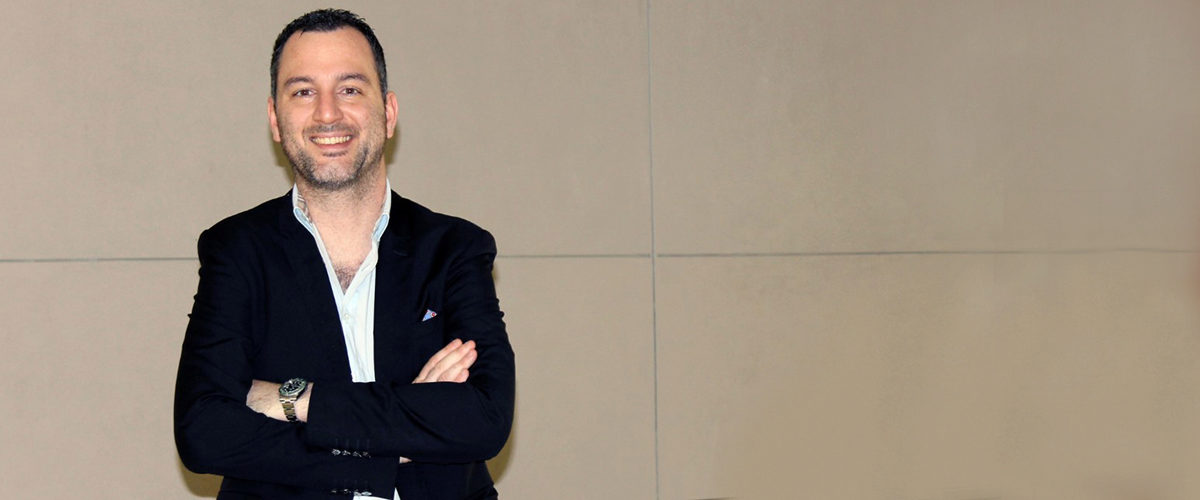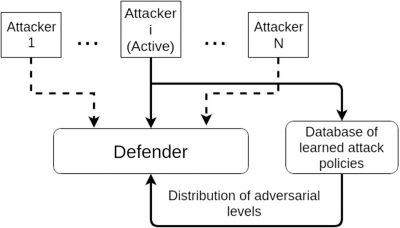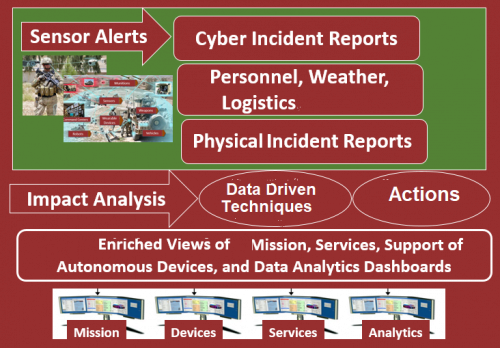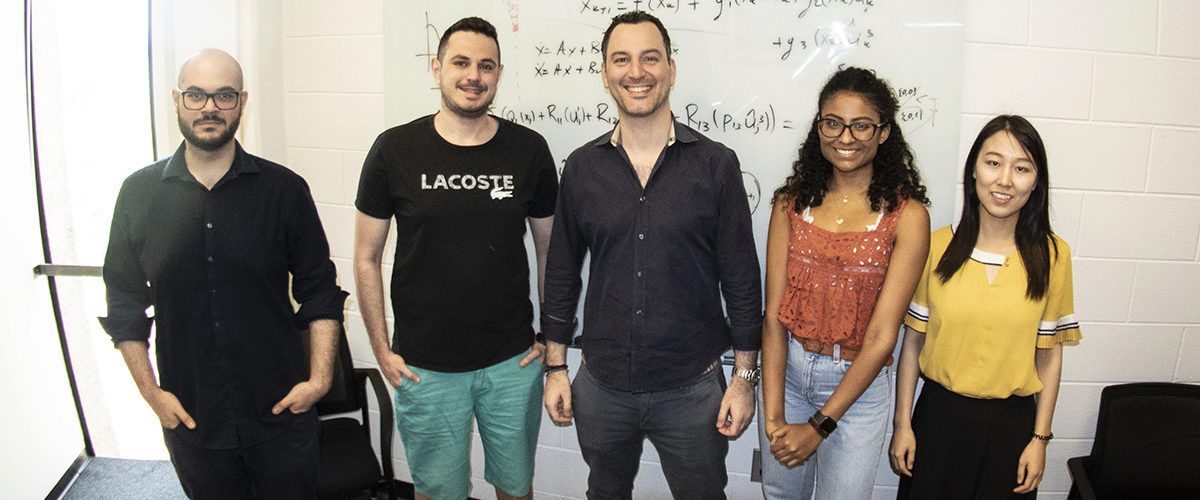 |
| Staying Busy with Research, Scholarship, and the Internet of Things. In addition to multiple sponsored research projects, Kyriakos Vamvoudakis is on the editorial board of nine schlolarly journals, including Automatica. In the fall of 2019, he will serve as the general co-chair for the 9th International Conference for the Internet of Things, to be held in BIlbao, Spain. |
If Hollywood is ever interested in getting that whole 'cyber-physical reality' thing right, they might come looking for Georgia Tech aerospace engineering professor Kyriakos G. Vamvoudakis.
Among his many research projects, Vamvoudakis is currently pushing the boundaries of aerodynamic intelligent morphing systems -- the engineering science that could literally turn that muscle car into an airborne cyber-hero for the next Matrix franchise.
Vamvoudakis smiles at the Hollywood reference, but he is not laughing outright.
 "All of my research in some way revolves around autonomous systems that constantly self-adapt, self-heal, self-protect, and self-optimize in unknown environments. This one, we've nicknamed the 'Transformers project' because we are designing a truck that can literally take information from the environment - like weather conditions or information about adversarial threats- and use it to re-shape the vehicle."
"All of my research in some way revolves around autonomous systems that constantly self-adapt, self-heal, self-protect, and self-optimize in unknown environments. This one, we've nicknamed the 'Transformers project' because we are designing a truck that can literally take information from the environment - like weather conditions or information about adversarial threats- and use it to re-shape the vehicle."
The benefits of re-shaping the vehicle while it is in motion are many, he says. The optimized shape can increase vehicle speed, reduce fuel usage, and improve safety -- all, while giving users timely access to harsh environments, like battlefields or natural disasters.
"So it's a carbon fiber structure, where we put actuators on the frame that will allow us to do shape morphing while you're driving at almost full speed. That makes it more efficient and safer, even in hazardous conditions. For instance, it won't skid because we can reduce drag proactively."
The so-called Transformer project - supported by a three-year, $325,000 NSF grant - is one of several that draw upon Vamvoudakis' noted expertise in control theory, game theory, and computational intelligence in designing secure, multi-agent networked systems, such as smart grids, and unmanned aerial and ground vehicles.
The work he is doing may have an obvious impact on the design of utility trucks or crop maintenance, but Vamvoudakis sees a much broader impact on the scientific community. Ultimately, this research has the potential to affect the direction of smart and autonomous systems research.
"We are developing model-agnostic algorithms that do not require us to know the physics, so that they can be applied to different platforms without any modifications. Essentially, it's a plug-and-play framework: once designed, it should be capable of optimizing, reconfiguring, and repairing - autonomously. And improved behaviors will develop over time as the models used to perceive, plan and act," he said.
"At the same time, they have built-in cognition, so they can process new information and become smarter in real time."
Vamvoudakis seamlessly connects the impact of this research with the rich intellectual legacy of his native Greece.
"The word ‘autonomy’ is taken from ancient Greek and means ‘self-legislation’ or ‘self-governance.’ The learning algorithms we are creating and the systems they can manage show great promise in giving us more autonomy in a complex world,"he noted.
"We are increasingly looking at a world where everything from urban transportation to crop maintenance and counter-terrorism measures will be depending on swarms of autonomous vehicles that will need to navigate unknown and changing environments. There are many applications for this research and they are all in high-demand,"
Turning again to his "Transformer" research, he is quick to make an important distinction:
"This is a collaborative effort. I am developing the learning mechanism that will change the shape. Others are designing the carbon-fiber structures and the environmental prediction models that will allow this."
Here is a look at some of the other projects that this busy researcher is pursuing:
Intermittent Learning Frameworks for Smart and Efficient Cyber-Physical Autonomy
In 2018, Vamvoudakis received a $500,000 NSF Faculty Early Career Development (CAREER) award to support"Towards an Intermittent Learning Framework for Smart and Efficient Cyber-Physical Autonomy" a project that seeks to apply operant conditioning, observed in humans, to cyber-physical systems (CPS).
 Broadly speaking, the research takes into account the imperfect nature of both the data that is available and the computational power and bandwidth that are available to process it. Available data is often superfluous, incomplete, or difficult to obtain, Vamvoudakis points out, but it is fundamental to the operation of CPS.
Broadly speaking, the research takes into account the imperfect nature of both the data that is available and the computational power and bandwidth that are available to process it. Available data is often superfluous, incomplete, or difficult to obtain, Vamvoudakis points out, but it is fundamental to the operation of CPS.
"These limitations force us to ask several questions as we develop bandwidth-efficient, secure, and robust learning frameworks for CPS," Vamvoudakis said.
"For instance: how can we incorporate and fully adapt to totally unknown, dynamic, and uncertain environments? How do we co-design the action and the intermittent schemes? How can we provide quantifiable real-time performance, stability and robustness guarantees by design? And how do we solve congestion and guarantee security?"
"The embodiment of the current learning frameworks in CPS give rise to several problems; these include: over-utilization of shared resources, loss of optimality, and security. In this project we are motivated by intermittent reinforcement in behaviorism, which is a conditioning schedule wherein a reward is not administered every time the desired response is performed," he said.
Non-Equilibrium Game-Theoretic Learning Techniques for Mitigating Adversaries in Complex Adaptive Systems
The recently announced Army Research Office's Young Investigator Award will provide Vamvoudakis with $360,000 over the course of three years to study non-equilibrium game theoretic learning as a technique for  predicting and mitigating attacks in complex adaptive systems.
predicting and mitigating attacks in complex adaptive systems.
Vamvoudakis will develop novel non-equilibrium game-theoretic adaptive algorithms for systems navigating dynamic, adversarial domains, such as those encountered in warzones.
His approach incorporates concepts from different disciplines, including game theory, nonlinear adaptive lear-ning theory, cognitive science, and network security.
"We want to develop a better understanding of how attackers think when they are attacking any number of targets - UAVs, for instance. We are using non-equilibrium game theory because psychology tells us that the attacker and the defender are not going to be acting rationally all the time. We wanted to model the irrational and, at the same time, track their intelligence -- how much they know about the conditions -- over time. Then, depending on how smart they are at any point, we will be better able to define a strategy to mitigate their consequences."
Eventually, Vamvoudakis predicts that this research will enable the military to better coordinate and protect teams of UAVs, manned vehicles, and humans in unknown and dangerous environments -- the very definition of modern cyber-warfare.
"The models, theories, techniques, and tools developed as part of this research will lay the foundation for the Department of Defense (DoD) to develop more effective techniques against intelligent attackers with different levels of rationality and capabilities," he said.
Data-Driven Learning Techniques for Cyber-Physical-Situation Awareness in Defense Systems
 Under a grant from the Minerva Research Initiative, Vamvoudakis is developing interdisciplinary techniques for improving the situational awareness of military security analysts who are tasked with characterizing, recognizing, and mitigating the actions of our country's adversaries.
Under a grant from the Minerva Research Initiative, Vamvoudakis is developing interdisciplinary techniques for improving the situational awareness of military security analysts who are tasked with characterizing, recognizing, and mitigating the actions of our country's adversaries.
As in much of his previous research, Vamvoudakis will develop novel data-driven learning techniques - mechanisms that will give users real-time, actionable read-outs of a given situation.
Ultimately, Vamvoudakis envisions analysts from the U.S. Department of Defense employing these learning frameworks to to support decision-making through prompt action. He also foresees the employment of 'automated assistants" to develop recommended actions for military strategists.
"This will significantly enhance awareness and safety in defense systems," said Vamvoudakis. "The guaranteed robustness of these techniques will reduce the need to reach back to higher command levels for approval. In the end, this will benefit mission completion goals."
Enforcement of Geo-fencing Policies for Commercial Unmanned Aircraft Systems
Collaborating with colleagues from Virginia Tech and the University of Arizona, Vamvoudakis has been developing reliable measures for detecting, identifying, and bringing down unmanned aerial systems (UAS) that violate controlled/restricted airspace.
"Essentially, we want to define strategies to take over an encroaching drone," says Vamvoudakis of the three-year, NSF-funded project.
"That will typically involve deploying a drone to investigate, creating a hacking mechanism to take over the auto-pilot of the encroaching UAS, and safely bringing that drone to the ground with minimal damage so we can find out more about how our adversaries are doing things."
Find out more about the research, scholarship, and conference activity of Kyriakos G. Vamvoudakis.
 Collaboration Matters. Vamvoudakis, center, is surrounded by four of his seven doctoral students, from left: Aris Kanellopoulos, Nick-Marios Kokolakis, Prachi Sahoo, and Lijing Zhai.
Collaboration Matters. Vamvoudakis, center, is surrounded by four of his seven doctoral students, from left: Aris Kanellopoulos, Nick-Marios Kokolakis, Prachi Sahoo, and Lijing Zhai.